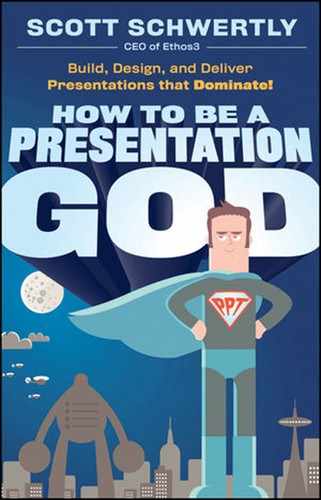Chapter 6. You Matter
Our age—the digital age—lets us quantify everything. We can measure almost every behavior with minuscule tools, allowing us to know the raw math and science behind more and more activity every day. In an increasingly empirical society, we have a tendency to over-rely on the substance of what we say and downplay the representative—in many cases, ourselves.
Yes, credibility depends in large part on the initial presence and veracity of real, meaningful data. Expertise requires a mastery of the most up-to-date information in a particular field. But when we talk about credibility in the presentation world, we don't mean whether or not the contents of your head justify your presence on stage. We're talking about whether the audience is inclined to believe anything that comes out of your mouth.
We can complain that this is unfair, that we shouldn't have to be a slave to audience perception, that people should make their judgments on the facts and not the apparent strength of the presenter. We can hem and haw about the post-physical world, where Steve Urkel and Conan the Barbarian have the same shot at getting the girl. Or, we can empathize with the audience for a change.
After all, what do they know about you? Perhaps they know you have a Ph.D. from a great school. Maybe they saw you arrive in a nice car, or maybe they read a short biography about you in the meeting agenda, or heard about you from a co-worker. But what do any of these so-called credentials mean to them? Regardless of your actual intelligence, pedigree, or achievements, the reality is that your audience has very few reasons to think anything about you, let alone trust you. Trust is an emotional commitment, not a rational decision.
This scenario can play into your favor, if you allow it to. The power of implied authority is strong, and speakers are suffused with this power at the outset of a presentation. You are physically elevated above the audience. You are the only person in the room facing a different direction; everyone is looking at you. You're dressed nicer than everyone else or, failing that, dressed more freely. Proving your credibility to the audience isn't going to require eyebrow tweezing, expensive suits, and various feats of strength. The psychological setting means you begin with a certain level of trust automatically. Unfortunately, the problem many speakers encounter is that they lose this trust shortly after opening their mouths.
This is your implied contract: The audience gives you the benefit of the doubt, and you in turn don't let them down. Of course, the reason the Presentation Revolution is alive and well is that speakers have not been holding up their end of the bargain. Audiences do their part by giving us the benefit of the doubt; we prove to be idiots, or—dodging that pitfall—arrogant and insensitive jerks. Dodging that pitfall, we appear sterile and boring. Dodging that pitfall . . . you get the point. There's always something, it seems. So how do we get a handle on audience perception?

Credibility is not expertise. Expertise fuels credibility, but they are not synonymous terms. In the presentation world, credibility equates to trust. At times, we trust because of expertise, but there are other elements involved: sincerity, likability, warmth, compatibility, etc. As you know, it's far easier to maintain trust than to build it from scratch, and far easier to build it from scratch than to rebuild it once it is broken. Recognizing the grace that the audience gives you is critical to mastering audience expectations and delivering on credibility.
